#and i think at this point I'm almost radicalized
Text
Live action remakes????
FUCK YOU! FROM NOW ON I WANNA SEE ANIMATED REMAKES
Comics adaptations even. Just to piss y'all off.
I hate it I hate it I hate it. This stupid trend of getting GREAT animated project and just fucking adding living people to it.
BROTHER I DONWANT REAL PEOPLE AND REALISTIC LOOKING DRAGONS. Why should I look at a watered down version of a fictional world (because honey let's be real cgi costs a teeny weeny bit too much) instead of a colorful, LIVING AND BREATHING animated world???? HUH?????
Also fuck remakes. I watched 3 remakes in my entire life and they sucked. Why should I watch something worse... or even just not as good as the original animated thing in teh first place???
I have the ANIMATED masterpiece right here I'm not impressed by your "very important actor playing this role that the original voice actor did better anyway" or your "not as bad as I thought would be cgi".
Seriously I don't get it, I'll be watching an action movie and I imagine at the cooler animated version and there's some boring-ass showrunner zapping through some episodes and going "guys here's what we're gonna ruin with realism next ^w^"
Also in 2 of the 3 remakes I watched they just flattened the characters and made them ✨️morally perfect✨️ and the third one was just the same thing with 2 scenes more that added ✨️NOTHING✨️
Also I find it insulting the existence of a remake in the first place. Like animation isn't enough and is the lesser art and NEEDS to be remade. Like fuck you? Fuck your realism-fetish.
#i hate live action remakes so much is unreal#and i think at this point I'm almost radicalized#because honestly they're philosophically wrong#and they're not even good#I tried watching avatar okay?#and the people telling “no actually is good is more mature look at people dying on screen”#i ask#Why#what is that I'm missing?#it's just bad all around#people are just bitching about it less because it looks good#like it's not that hard making anything better than the og movie...#steel rambles#also really#do we need a live action remake of Moana????#not even 10 years ffs#and HTTYD...#DO WE REEEEEALLY NEED IT???#REALLY??????#I'm just so tired i see cool animated projects getting canceled and discontinued and live action remakes with costs ridiculously high#getting the greenlight#and the production costs are ridiculously high and the actors spend 75% of the show standing and TALKING#fucking infodumping instead of showing#like i get not everyone gets subtle details#BUT PLEASE SHOW DON'T TELL ME EVERYTHING#this is not effing Dora the explorer i didn’t sign for this#sorry for the rant seriously but just#ffffffffffuck
3 notes
·
View notes
Text
.
#ii.......#i think I'm at rock bottom#I'm at the point where I'm having trouble verbalizing or communicating in any way because i feel like it's so pointless#i feel so enormously fucking guilty for feeling so bad#and because i can't talk i can't put myself out there to build a network to give me the support i need#or the feedback#to keep on creating because that's legitimately the only thing i think I'm really good at#and what's the fucking point#what good can i do if i can't reach anyone to make change#my family won't listen to me#my best friend thinks i overthink shit#and i genuinely feel like I'm not radical enough for my friends#i feel so alone all the time#everything is shit IRL#there's bad family shit on both sides#we can't afford a house after being in an apartment for almost eight years#i can't promote myself anywhere without risking losing what minute platforms i have and i..... if i lose them#I think I'm going to give up#i can't talk freely *********anywhere********#and when i mention it i feel like all I'm going to get back is a 'welcome to the club toughen up'#I'd rather just not talk at all#that feels like that's the message behind those kinds of answers anyway#and i get why people say it#but I've been trying to get better for years and i just..........#all i have to offer people is hope and i feel so fucking hopeless so what's the point
12 notes
·
View notes
Text
As a trans man, seeing the state of modern femininity always makes me feel like I, someone who has almost killed myself multiple times from my dysphoria, have less dysphoria than many cis women. Like, cis women will literally pay hundreds or thousands of dollars to have someone shave their own body hair for them. Plenty of cis women out there spend near-infinite amounts of time, money, and energy trying to "fix" natural features about themselves. Some will even get expensive surgery. And if I wanted to have a surgery, that would take me years to get approved. And would require me to lie about my sexuality to even be considered.
I'm someone who famously thinks gender is a stupid performance, and it's one that I do spend quite a lot of effort on—just ask my bank account, or the ribs that I've damaged from wearing my binder for too long. But many of the cis women who do this do not do it as a fun performance, they do it because it has been drilled into their heads from the day they were born that their value is based on appealing to standards of heterosexuality, which are dominated by straight cis men. Yet even I do not spend hundreds of dollars a month on masculinizing procedures, even though whatever procedure I would do would probably make dysphoria better.
So why do some cis women go lengths to meet gendered standards that even many severely dysphoric trans people do not?
Just some food for thought.
(This post is not about trans women, though they can be subjected to patriarchal, heterosexual female beauty standards. The point of this post is to make people think about how cis women, generally without gender dysphoria, hold themselves to beauty standards as if they do have it.)
(On a similar note, TERFs and their ilk, this is not a post for you. If you interact with this post and I see that you hold radical feminist beliefs or exclude trans women from your feminism, you are being blocked and reported.)
1K notes
·
View notes
Note
Could you do a piece where snow forced reader to dress more conservatively and change her hair (cut and style) compared to her normal look and clothing?
"𝐀𝐧 𝐞𝐥𝐞𝐠𝐚𝐧𝐭 𝐬𝐚𝐜𝐫𝐢𝐟𝐢𝐜𝐞."
pairing: president!Coriolanus Snow x f!reader.
summary: Coriolanus didn't just change him but he also changed you.
warnings: mentions of unhappiness, explicit words + take a look at the masterlist!
word count: 1.024!
notes: here it is, anon! and i think it was too long 😖 but i'm satisfied with this work, enjoy it and i hope you like it!
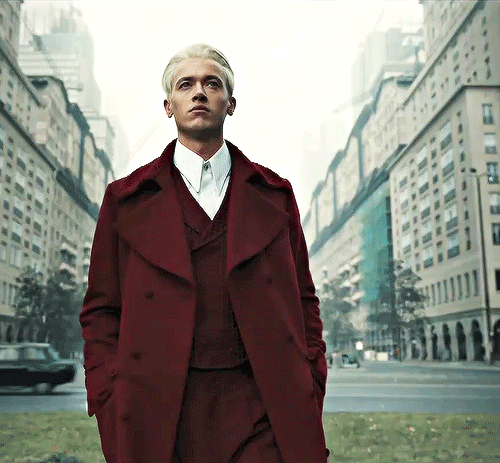
The one in the mirror, truly you?
That question, a confused inquiry, had compromised itself in your mind; with no intention of simply disappearing and leaving you alone. — A lump of embarrassment and imposition formed in your throat.
The image of a woman wearing cautious, at one point even intimidating, and, extremely, expensive clothes was trapped in the huge mirror. — The fabric of the white pigmented dress was very well prepared and dedicated, accompanied by some divine pearls; it would be cruel to touch them. — Jewels around her neck, giving her an air of purity and elegance.
Her posture was honorable, drawing attention from discreet and daring glances; a lucky woman who everyone wanted to get their hands on. — Being the reason for fights and threats between compromised souls.
That wasn't you, but at the same time it was. — That conservative, intimidating style would never be used by you on a casual day or for your good will; your chest would never feel comfortable in such a garment. — You would never feel comfortable with that whole situation.
However, your loved one admired that change in you. — Such a drastic, sudden and radical change that Coriolanus brought to his life; which he dedicated with love and care.
Coriolanus changed everything in his chest, and perhaps even in his soul, throwing that poor, rotten carcass somewhere no one would find it. — And when he saw the chance to change you, you sweet, naive girl, Snow wouldn't let it fall through his fingers.
All the best articles of clothing in the Capital were in your hands, gifted by Coriolanus. — It didn't matter the price, if countless hands were spent producing that fabric, he wanted to see you using it; independent of all. — And you made a point of making him satisfied, happy.
Even though you hated with all your strength, which was so fragile and delicate, that image that was beginning to be built in you; thinking deeply about your old image, about how you really were. — Your chest was tearing, burning and wanting to destroy every bit of that glass that witnessed his current reflection.
But, Coriolanus loved you that way. — He was so pleased.
"Here you are!" — Upon being mentioned, mentally, Coriolanus's voice echoed through the modest and cold room; coincidentally, like him. — Making your thoughts disappear, as if they never existed and didn't bother you.
Wanting to see him, you directed your head towards the door and came across those deep, vigorous eyes, which were once dreamy, staring at you. — The expression of pride formed on Coriolanus's fascinating face; a face that you are sure was carved by blessed souls.
Coriolanus admired you, agreeing how that dress, personally chosen by him, hugged your body in an exquisite way; you were perfect. — If he had the opportunity, even though he has and could snub her, Coriolanus would keep you for his eyes only.
And that spark of thought, an idea began to sink into the head of the boy, or rather, the man Snow every day, minute and second.
"My beautiful girl." — Coriolanus directed his steps towards you, causing some noises on the floor coming from his shiny and expensive shoes; shoes worth half the lives of the Panem. — "So beautiful…"
"Thank you, Coryo." — A thank you in such a fragile voice, almost coming out as a whisper; deep down, you didn't want to thank him for that compliment because you felt like it wasn't really meant for you.
Now the presence of Coriolanus was behind you and joining the mirror; the difference in height drew so much attention, giving you butterflies in your stomach. — You couldn't justify whether it was the excitement of seeing him or the intimidating feeling he showed, but you didn't deny the happiness that grew in your chest. — He was there with you.
Well, a different reflection of the Coriolanus you knew but he was there.
Without saying anything or even sighing, Coriolanus passed his arms covered by the long-sleeved white t-shirt, which was very reminiscent of his dear father's, around your waist; his hands passed over the slightly rough but comfortable fabric of the dress. — There was nothing comfortable about that dress for you. — Distributing a simple squeeze, a sign of wanting your attention, in the region.
For a second, you held your breath, not knowing the reason for this action, and your eyes focused on the mirror. — Coriolanus' head resting on your shoulder, his lips forming a convinced and enchanted smile before you; equal to a man when building a work with perfection and a lot of dedication.
"That dress looks perfect on you." — His dangerous and arrogant lips left long kisses on your neck and areas close to your shoulder; it tickled, it didn't bother you, and it let silent grunts escape your mouth. — "Don't you agree, my dear?" — Coriolanus wanted to elicit a specifically positive and obedient response from you.
At that very moment, and for the first time that morning, Snow didn't get what he wanted. — No words came out of your mouth, just a miserable sigh; still feeling his kisses on your sensitive part of your body.
"Answer me." — He interrupted the sealing session with his authoritative voice, a tone of voice that he began to present in recent times; Coriolanus listened and watched you swallow hard. — "Or are you not satisfied with everything i have done and given you?" — He was bitter and so cruel at the same time with those words.
and God, that's not what you were thinking.
"No, Coryo!" — Was it a scream? You didn't even realize that you had let out a very loud tone of voice. — "No, no." — Shaking your head quickly and disagreeing with the fallacies your lover uttered, you tried to calm the situation. — "That dress was great, i loved it."
Now, a nervous and distressed smile formed on your beautiful and stubborn lips against Coriolanus' venomous and superb smile. — He had you in his cold, rich hands, he had you in the cage like a little bird crying for freedom. — He had you.
"You don't know how happy i'm about this, my love."
#coriolanus snow#Coriolanus snow fanfiction#coriolanus snow x reader#coriolanus x reader#coriolanus snow imagine#the hunger games#the hunger games the ballad of songbirds & snakes#the ballad of songbirds and snakes#ballad of songbirds and snakes
717 notes
·
View notes
Text
So I've spent a lot of time untangling Christian exegesis of parables and talking about how the way Christians interpret parables almost always ends up being antisemitic.
But aside from how it makes them think about Jews and Judaism and Jewishness, I also want to talk a bit about how it makes them sympathize more with abusers than with victims.
The easy-to-point-to culprit here is the trilogy of parables that culminates in what most Christians know as the Prodigal Son story.
The common interpretation of these parables is that God does (and therefore Christians should) value a repentant sinner over someone who's never sinned.
The problem here isn't the stories themselves--they're pretty enigmatic as far as their actual meanings--but Luke's gloss:
"Just so, I tell you, there will be more joy in heaven over one sinner who repents than over ninety-nine righteous persons who need no repentance."
(Mark says, "So it is not the will of your Father in heaven that one of these little ones should be lost," which is very different.
So on its face, in 2023, that's a blatantly dangerous, abuser-supporting belief. What is it like to be a child sexually abused by your youth pastor and to hear that the fact that he hurt you is part of what makes him somehow spiritually "better" than you?
And we can see it play out in the way Kevin M. Young, a popular progressive pastor on Twitter (who describes himself as "post-evangelical" and was the senior pastor at a Quaker congregation) responded to being told one of his tweets was antisemitic, and then jumped in to support a woman who responded by identifying herself as a fan of John Chrysostom (the literal author of "Against the Jews" and the most antisemitic of the Church Fathers, which is saying something).

I'm not going to transcribe the whole thing, because it's not all that important for what I have to say about this, but I am going to call out a few lines:
"The American Christian approach to t'shuvah sees the victim's spirit, character, and speech as equally important to the offenders. I.e. in Christendom, the victim can exceed the sin of the offender simply by their reaction (if it be in sin or acted in a way that is not Spirit led)."
So, to be clear, if someone assaults you, and you don't meekly forgive them in a "Spirit led" way, you're somehow worse than they are.
The uniquely Christian brain rot here is in seeing every sin as an opportunity for forgiveness. After all, if being a repentant sinner gives you a higher spiritual status--if there's more "rejoicing in Heaven" over you--than that of your victim, then you have to sin to get there. It treats other people as props in your salvation journey, not as fellow humans whose suffering matters. (Combine that with the Christian idea that suffering is somehow virtuous in and of itself, and you've got a very toxic recipe. Not only, by abusing others, are you guaranteeing your own value as a repentant sinner, but you're giving your victim the opportunity to ennoble themselves through suffering.)
Of course, a key word here is repentant. Put a pin in that.
These sort of exchanges on Twitter--a Christian being outright genocidal toward Jews, and a supposedly progressive Christian figure jumping in to defend the Christian, with seemingly no ability to comprehend that the Jews in the conversation are human beings who may have their own trauma around violently antisemitic language, with boundless empathy for the Christian abuser and none for the Jewish targets of their abuse--happen frequently and just as frequently leave Jwitter baffled in addition to angry.
Why all this empathy for the abuser and none for the victims?
I think a lot of this comes out of progressive Christian exegesis of parables, which is frequently looking for the radical "twist" to the story.
E.g. in the story of the Pharisee and the Tax Collector, the assumption is that the audience of the time would have empathized with the Pharisee, and thus the twist is to make them empathize with the tax collector. In the story of the Good Samaritan, the assumption is that they would have seen the Samaritan as a threat, and the twist is to make him the hero.
The thinking goes that the audience would have had empathy for certain groups and none for others, so the stories push them to feel that empathy for the latter, and that this was needed to balance the scales, to make sure everyone was receiving love and empathy and care.
Except that this, in modernity, has the effect of simply reversing the roles, not balancing them. The groups that are assumed to be in good social standing get no empathy, even become the implicit villains, and the groups (supposedly, since this is now a Christian-dominant society) traditionally looked down on get all of it.
That might still be a balancing act if the "looked down on" groups were actually marginalized. But in the Christian imagination, that role is filled by sinners in need of Christian grace, not necessarily demographically marginalized groups.
The idea seems to be that the victims are getting sympathy from elsewhere, so it's the Christian's job to make sure the abuser/sinner gets sympathy too.
But I'll point again to that pesky word "repentant."
Ultimately, when it comes to treatment of Jews and Muslims and anyone else who points out that a Christian has in some way harmed them, Christian sympathy goes immediately to the offender before the offender has even expressed any repentance.
The repentant sinner is so much more valuable, at this point, than their victims that they must be preemptively forgiven, that they are more valuable purely because they now have the potential to repent.
And this seems to be lurking under not just how "progressive" pastors act on Twitter, but in a lot of our cultural narratives around, say, college rapists and their futures, around white people who are publicly called out for racist acts, etc.
730 notes
·
View notes
Text

Name: Blewbird
Debut: Super Mario Bros. Wonder
Blewbird is weird. I mean, no duh, it's being featured on "Weird Mario Enemies," even if our blog title gets less and less fitting by the day, but I mean weirder than you'd realize by just looking at it at a glance. If you just take a quick glance at it, you might not think much of it -- just a stylized cartoon bluebird, reminiscent of The Artist Formerly Known As Twitter.
But then you look at it more closely, notice things like its black shell and brown shoes. How weirdly smooth its skin is, without even the suggestion of feathers. The fact it doesn't have wings at all. The fact these things burrow out of the ground.
Oh, and let's not forget the fact they shoot off their own beaks!

Yeah, let's not ignore the main hook of the enemy here! Blewbirds predominantly appear in the level Blewbird Roost, where they'll stand against walls and shoot out their beaks at Mario and Friends. Of course, usually their beaks end up sticking to walls across from them...

And unfurling into platforms! That's right! Blewbirds are an animal that evolved to create Platforming Challenges! Is this how they traverse all the open air in the caves they live in without wings? It's not like they can burrow everywhere!
So whatever Blewbirds are, I'm pretty sure they're not birds. Blewbirds are birds in the sense that jellyfish are fish. (A comparison I'm pretty sure I've made multiple times on the blog at this point.) But if they aren't birds, then what are they? Well, let's take another look at Blewbird without its beak...
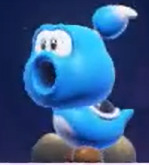
Does it remind you of anything...?

Because it reminds me of Birdo, another character who's named after a bird for no particularly good reason whatsoever! Almost like it's all connected... But I mean, the similarities are hard to ignore -- the tube mouth optimized for shooting projectiles, the white underbelly, the weirdly smooth skin, heck, you could probably make the very bold argument that Blewbird's ponytail and Birdo's bow are connected somehow.
But wait! I'm not ending things right there, because Blewbird doesn't only have similarities to Birdo...
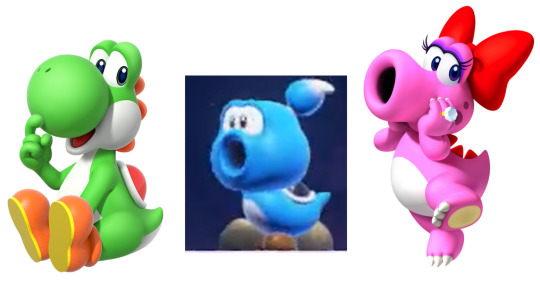
You see, Nintendo has connected the Birdos and Yoshis for a while now, as Mario's main Weird Dinosaur Characters, but there hasn't been an awful lot actually connecting them in-universe... until now?! For you see, I'm making the radical claim that Blewbirds are proof of a missing link species that connects the Yoshis and Birdos! Look at it! The tube mouth of Birdo. The shell and shoes of Yoshi. It's all so clear now!
Blewbirds aren't birds! They're some sort of weird dinosaur! Just like... just like... just like real birds. Hmm.
Maybe I need to rethink the point I was making with this post. Taxonomy is weird, guys.
*phone ringing*
Oh! Hold on, I need to answer that. Hello?

Hmmm... as a matter of fact, I think I am! I spent so much time talking about Yoshis and Birdos that I forgot to do this: *touches Wonder Flower to trigger Wonder Effect for the post*

During Blewbird Roost's Wonder Effect, Blewbirds will start blowing very large, very colorful bubbles! Your character can bounce on these bubbles to go *Pauline voice* ♪ High up in the sky~! ♪, but you need to be careful, since each bubble pops when you jump on it! The number of Blewbirds in the Blewbird Roost doesn't make that much of an issue, but in a Special World level where you're a Goomba who can hardly jump at all? Well... Good Luck!
That being said, this raises even more questions about Blewbird anatomy, because they blow these bubbles out of their beaks! You know, the ones they shoot off that, as far as I'm aware, aren't even part of their bodies? And in order to blow bubbles out of their beak, their mouth has been moved to the end of it! What is going on here?!
I'm not sure, but I can try to provide a relatable human analogy! Imagine if you put a Cone in your mouth, but someone nearby touched a Wonder Flower, so the Cone fused to your face and the mouth was at the end of the Cone, and you were very scared about this development so you tried to scream but only bubbles came out. We've all been there! And for the Blewbird, it's exactly like this. Hopefully now you understand!
413 notes
·
View notes
Text
This may make some of my newer followers disgusted by me but I feel like this perspective should be addressed. I have had problems with hypersexuality since genuinely as long as I can remember. Like, I'm talking about six and seven years old. Before I even understood what was wrong with me. I'm not going to get into details because the truth is that the details that I have are blurry at best and any attempt I have ever made to uncover more has only led to panic attacks and alcohol relapses. At around 13 I discovered porn online. Not like I didn't know it existed, but, I had never interacted with that kind of content previously. I had a serious porn problem until I discovered radical feminism, honestly. It opened my eyes to what should have been in front of me. Things I knew deep down but wanted to forget because it's okay if I'm imagining it happening to horrible me, right?
And, I'm not talking about the most baseline forgivable. I mean hard kinks. I mean that I was self-destructive to the point that I begged my boyfriend to go farther than he seemed to want to at times. And I honestly wanted to die and for him to be the one to kill me. When I was being choked I feel like I was going to reach the gates of Heaven. That peace was nearing because death is the ultimate freedom. I was so masochistic. I was such an alcoholic, dealing with anorexia....what I have never been clinically diagnosed with but I could only describe as violent OCD. I thought I could control what terrified me by playing pretend. Needless to say it did not work and it did not help in any capacity. But, if you asked me back then I would have told you it did. And I would have mostly believed that.
I channeled all of these problems into sex. It was all I could think of. I masturbated CONSTANTLY. It's like I was on fire all the time. The online communities I lingered on and even some female friends irl to this day told me that it was completely fine and healthy to cope with these problems, especially the childhood....whatever with things like CNC. That it was just my old man that didn't do it correctly. I think about a lot of this almost daily and guilt isn't a good enough word to describe it. If there is a word beyond that or shame I don't know it, but, I feel it. At this point in my life my sexuality.....is almost a dead weight. A big part of me thinks I will never be cured, that my need for pain and my need for sex will trickle back the same and I'll explode.
I say all of this not for pity points, but because I think that fucked up women deserve to have a place here and for things like this to be discussed more openly. People can't be born pure and many people learn by terrible mistakes. Or maybe I'm the odd man out. Either way.
#ive made a few posts abt this and delted bc 1 no one interacted lmfaoo and#2 it was just way too personal#radblr#radical feminist safe#radical feminists do interact
196 notes
·
View notes
Text
Almost everybody has at least a *little* bit of a point.
Yeah. Even them. And being wrong about everything else doesn't actually change that. They might not know how that point should actually be interpreted, they might come to foolish or even actively harmful conclusions from that point. They might radically overstate how prevalent or important the point is. But don't fall into the trap of refusing to acknowledge things that are true just because a bad person says them.
I cannot tell you how many times I've seen someone from a group I belong to dunking on someone from some outgroup, even a very harmful outgroup, and in doing so, denying basically true things that we would absolutely agree with if we were talking about them in private.
I dunno. Maybe it bugs me for neurodivergent reasons. Maybe I'm a pedantic ass.
The other day I got into a massive fight online with a guy in a feminist group because he was squabbling with a bit of a dipshit who pointed out that men are under a lot of pressure to become financially successful, and that's why they do stupid shit like get into crypto.
And like... rather than say "yeah, men are still expected under hegemonic masculinity to be breadwinners, despite the advances of women into the workforce, the economy being in shambles and the middle class having been whittled to a toothpick at this point. We need to work as feminists to challenge that gendered expectation, and as leftists to rebuild the power of labour to allow everyone, both men and women, to have a living wage that can allow for a family and a dignified life." This other feminist guy decided instead that, since the concept of men being pressured to be economic providers was being used in a way that sounded like it was suggesting that women only want to date rich men, it was redpill propaganda and, therefore, fascist misinformation. He went with, "what are you talking about, Gen X killed the concept of corporate success as marker of personal worth, everyone agrees that being a workaholic is bad and unattractive now. The idea that you think you'll be judged for being poor is a lie spread by the right to radicalize you into hating women." He did not react well when I pointed out that he was just as wrong as the other guy was. More wrong, actually.
And like...you can build multiple arguments from the same data point. Some are well reasoned, some aren't. Someone can feel pressure and assume it's much more widespread than it is, or that it takes a much more extreme form than it really does. But if you're going to coherently argue against an idea, you have to honestly appraise the situation and figure out what grains of truth it has in it. You have to acknowledge that core root of truth and show them how it means something else.
If, instead of doing that, you just deny the true thing because the other person's argument is built on it and you want to stamp it out? Because, hey, they interpreted it wrong, it's not like they really believe something true? You act as though a fact used to support a lie is also a lie. And if you do that, and argue against the facts because their conclusions are stupid, you construct a little world where, in refusing to accept both their flawed argument AND the fact it's based on, you become more wrong than they are. And you make the deeply foolish choice of picking a fight in that world. And if it's on the internet, that little world can become pretty big. Tactically, it's about the dumbest thing you could do. It ensures that they will keep fighting you because...you're fucking obviously wrong? It radicalizes people, because suddenly the only people who will acknowledge the truth on this thing they care about are other terrible people. It makes your side look dogmatic and ignorant. And apart from all of that...it gets things completely backwards.
Your principles are what you want to use to change the world for the better. You believe them because you honestly believe that following your principles improves things, because they are based on a solid grasp of how the world works. Your beliefs follow from what is true. If you flip it so that whether something is true is based on whether it supports your beliefs...that's a bad road to go down.
138 notes
·
View notes
Note
Hi, please ignore if this is too personal, but as someone with Jewish ancestors who is considering conversion, I'd love to know your reasons for converting? For me it's more about community and reconnecting with that part of my family (there's a complicated family history there) than about religious belief, but I'm worried that might not be enough of a reason, if you know what I mean?
I don't know, I think conversion to Judaism is hard enough that if you don't have "enough" of a reason, you'll find out -- but I also think that one doesn't have to have a "sufficient" reason to convert to any faith which allows it, just determination and respect. If you want a connection to your ancestors and community, that's a very powerful motivation. And if it's not enough to sustain you through conversion, that's still a huge self-discovery for you, and while some practice should remain closed, you can still connect through things like traditionally Jewish foods and appreciation for Jewish art and culture.
For me, it's not that it's too personal, but it's difficult to vocalize; often when I'm asked about converting there's an assumption that I'm marrying a Jewish person, and when I say no, I usually add, "I just hear a call." Which admittedly is much more often said by Christians joining a ministry, but it's the most truthful I know how to be in short. Something in Judaism speaks to something in me. I have very little Jewish ancestry (although every time the DNA websites reevaluate their calculations it ticks up a percentage point, which is hilarious to me; I'm up from 2% to 6% currently) but the attitude towards the divine, the strength of tradition, the respect for learning, they all speak to my soul.
Even the hard stuff -- content in Torah or Talmud that I find difficult to reconcile with modern sensibility -- is at least something to challenge me, and Judaism is a faith that encourages argument, so I'm allowed to have a critical opinion of it. I think a lot about a quote I read from someone (possibly a reader, if so I am so sorry I can't find your name in my memory) who said, "I keep kosher, but sometimes I eat bacon when I'm mad at G-d." I think a lot about my Methodist confirmation class, where I was almost kicked out because I thought the Parable of the Wedding Feast was stupid and continued to argue against it after, realistically, I should have stopped; if it had been a class for a Bar Mitzvah, we might have been allowed to really examine it instead of glancing across it awkwardly and moving on. (As I found out years later, it was basically about how anyone can be a Christian but Jews should be punished for refusing to convert, so you know. Even as a kid I was very Jewish in my approach to theology and knew anti-Semitic propaganda when I heard it.)
I like that so many of the traditions involve things that I find compelling: bread, fire, water, the written word, the cycle of the harvest. I like that there's a search for truth and precision in Jewish scholarship, and that scholarship often seems to reward a neurodiverse approach to faith and study. As someone committed to philanthropy and versed in radical compassion, the exhortation to care for others baked into every foundational Jewish text is also very attractive. Some of the prayers I find viscerally satisfying (particularly the Traveler's Prayer, for some reason).
I find faith in a single divine entity extremely difficult, but one of the first things that got me to seriously consider Judaism (something I'd already been interested in) was being told that you can be an atheist Jew. To be able to commit to a faith community while still struggling with faith itself feels special to me. Whether a divine entity caused the miracle of the oil we celebrate this time of year is immaterial to me; the beauty of the narrative, the righteous rebellion rewarded with eight nights of light, is enough for me.
I might never finish conversion; realistically while I've done a lot of studying I still haven't worked extensively with a rabbi on a conversion path, and I do not call myself a Jew and won't until I complete conversion (I do observe a lot of the holidays and prayers, but mainly because that's generally advice to converts, so they can understand the demands of the faith and the myriad issues with being Publicly Jewish). But that's fine too; Judaism has been around for thousands of years, it'll wait for me, and if I never convert I'm still enjoying the journey.
185 notes
·
View notes
Text
Changing people's minds on major things is actually a very long and difficult process for both parties. I didn't actually believe that pedestrian-centric city design would be better for people that drive cars until I spent almost a year living without a car and watched hours of youtube videos explaining the issue to me. Turns out that traffic actually does go down and driving does become more pleasant if you make it harder to drive a car and easier to walk. I just straight-up refused to believe that for years. Because people just talked about it like it was obvious. But it wasn't. Because I had spent my whole life in a car-centric city going around in a car and also I was an English major in college who did not study urban planning. You can't expect me to change my entire mindset around transportation all at once. I did reach a eureka moment like two weeks ago but that was after like three years of getting exposed to these ideas periodically and living without a car for 11 months.
And yeah this post is about my big dumb animal brain accepting the science behind narrow roads and the evils of certain types of zoning laws, but it's also about stuff in general. If you don't know why someone isn't changing their mind on something, it's probably because the information they're getting hasn't reached a critical mass in their monkey brain yet. Whenever you hear stories about people changing their minds on things or leaving a certain ideology the story never goes "A person on the internet did a slam dunk on me and then I changed my mind."
It's usually a long process that happens over the course of months or years. Seeds planted here and there that coalesce eventually into a new thought or ideology over the course of years or snap together or send someone down a new path after a certain event. Same with me about pedestrian-centric cities. For me the tipping point was finding this video, which isn't necessarily super special or the best and the guy who runs the channel, in my opinion, isn't the most qualified or the most sympathetic towards every city in every situation, but it was the feather that tipped the scales in my brain to "Oh, wait. Maybe everything I thought I knew about how cities work is wrong actually." But that video alone didn't change my mind. With the amount of stuff and people that have gradually and gently been giving me information over the past couple years, something else was bound to eventually change my mind.
People on Tumblr yelling about abolishing the car, if anything, slowed down me changing my mind. Every time I saw a person saying that driving cars is stupid and that cars are bad I took a step back into my old way of thinking in defense. Because I grew up only ever using a car to get around. Rhetoric like that felt like a direct attack on my family, who I know to be loving people who care about other human beings and who drive cars literally everywhere.
And you might say, posts and videos like that aren't actually an attack on people that drive or have to drive. Okay then. Why are they phrased like that? Because that makes you feel good? Because you're angry? Alright, your anger at how it's currently impossible to get around if you don't own a car and how people who don't actually want to drive are being forced to drive is reasonable. And now I understand why it exists. I'm kind of angry too now that I get how this stuff works. However, is calling the people you're trying to convince stupid to their face and immediately bombarding them with your most radical ideas that might be completely detached from their reality and how they understand the world really the most productive way to channel your anger?
What about a guy with a knee problem that lives in rural Appalachia? Do you think he is gonna be convinced by your angry rants about bike lanes? No. He lives on a mountain that he can't climb or bike up because he's disabled and has only ever known getting around in a car. What about a person who overheats easily living in a suburb in the middle of the desert? Do you think she is inspired by your green lush pictures of trolleys running through parks in The Netherlands? No. If she leaves her house for too long without ice water she could literally die and you're going on about getting rid of, in her mind, the only thing that lets her go to the grocery store and not faint.
And again, this post is about my inability to comprehend walkable cities, but it's also about everything else you might ever want to convince someone of. The way you talk about things with your in-group that knows exactly what you're talking about should not be the same way you talk about that thing with people that you're genuinely trying to convince of something.
4K notes
·
View notes
Text
Curious about the direction the HP fandom has gone
Okay, so as an old HP fan from way back when the books were first coming out, and then getting hit with the nostalgia and decided to return after years and years of not interacting with the fandom at all, the changes are truly mindboggling and I'd love to get to the bottom of some things.
Like, the disappearance of Blaise Zabini. Blaise was a fan favorite way back when we only knew his name but now I barely hear a whisper of his name. Now, the obvious answer is racism, which I think is the #1 reason why Blaise-pairings have dropped of significantly. Back then we all thought Blaise was a hot Italian girl, and then we found out he's a black man and suddenly people stop writing about him? Hm, yeah, seems the obvious answer (especially considering the popularity of other characters who are just a name on a page *cough*regulusblack*cough*).
Or the rise in Snape-hate. Like, Snape used to be the fan favorite. Everyone loved Snape. The meaner he was, the more we liked him. Being mean to children was a plus, not a negative lol. And this was back when we all thought he was a pureblood who came from a wealthy family like the Malfoys. Now by the time the 7th book came out I had pretty much moved on and so I didn't really see the fallout of readers discovering his actual background, so I don't know if his drop in popularity is classism and learning that he isn't a palette-swapped Lucius Malfoy or not, but honestly I would figure his impoverished background would be a plus in these times. Like Snape is obviously one of JKR's least favorite characters, and considering how she-who-must-not-be-named has destroyed her reputation with her increasing radicalization you'd figure the poor, abused, author-hating character would become more beloved instead of the rich, white, heteronormative bullies who barely even show up in the books. Like with our increasing knowledge of social injustice, I just don't understand why the fandom would want to latch onto the Marauders? And I just can't believe Snape's handful of snippets with Lily is the cause of his downfall (like what's there is barely enough to fill up a few pages, and there are certainly more toxic relationships in the series that are still beloved), or the fact that he was a Death Eater or that he inadvertently caused the deaths of the Potters (we already knew that in GoF and HPB respectively and he was still beloved, and this was when we assumed he didn't give a shit about the Potters or if they died when he went snitching). Draco is still popular. DRACO who doesn't give two shits about slinging around the word "mudblood," as opposed to Snape who actually changed for the better.
Am I just too old to understand? Is this like 90s fashion coming back in style (no, I won't do it again, I don't care if it's cringy I'm sticking with my millennial styles, I did the platforms and the slip dresses and the cargo pants in high school and I'm not putting myself through that again lol you gen z's can pry my comfortable mom jeans from my cold, dead fingers, I don't care if it makes me look old, that's the point, I AM old). Like, in addition to 90s fashion, has the 90s obsession with luxury athletic fashion like Lacoste come back in style? All those fashion ads of rich white people on yachts with popped collar polos? Are people starting to obsess over the Marauders because nouveau riche conspicuous consumption is coming back in style? It can't all just be young kids who have only read AtYD and have never actually opened one of the books, can it?
There also seems to be a trend of treating characters as if they're real people. I mean, we've always done it (Snape Wives, I'm looking at you), but now it almost feels as if the crimes characters commit are treated as if they're real crimes and that liking them is somehow a moral failing on the reader's fault. If you were to say "I don't like Snape, his douchy actions anger me, I'd rather skip all the parts he shows up in" I'd say, cool, I get that. That's normal. But "Snape is an abuser, a racist, and an incel and if you like him you're probably those things too" is fucking weird. Like, Harry and Hermione are not real children. Snape is not a real person. The things that happen in this book have as much influence on the real world as me imagining ninjas breaking into my workplace on a slow day. And that "media does not exist in a vacuum" pisses me off because it's blatantly misused. The pieces of media that have had serious consequences? Jaws, The Birth of a Nation. One resulted in the culling of sharks, the other helped restart the KKK. Do you know what those two pieces of media have in common? They're not about fucking wizards and magic schools. They instead paint a target on real groups. After twenty years nobody has ever tried to hurt a marginalized group of people because of a harry potter book (except for JKR herself).
Anyway, these are just some random thoughts, feel free to chime in with your own.
#pro snape#severus snape#pro severus snape#snapedom#mostly snape some blaise#would love to hear form some marauders fans but im not touching that tag with a ten foot pole#yikes
140 notes
·
View notes
Text
First Kisses ft The Hamatos
Genre: Fluff
Sub-Genre: Hurt/Comfort (Casey's section)
Warnings: Light Movie Spoilers
A/N: Three fics in one day?...Why not four?
Raphael
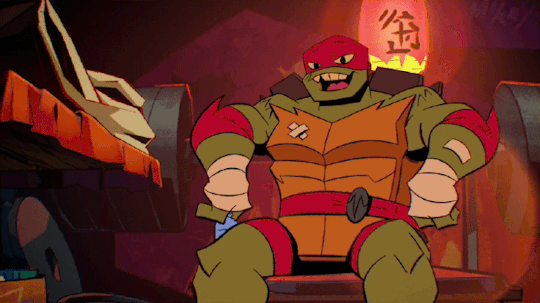
Raph gave out affection almost as easily as he breathed. He heart was so full of love and adoration for every living thing around him. So, when he told you he liked you, you thought it was just him being Raph.
"No, I like like you," Raph said, after a few moments hesitation.
"Oh...Oooh!" You exclaimed, the few braincells bouncing around your skull finally meeting up to give you an actually clear thought for once.
"You don't, uh, have to get back to me right now. I can wait for you to figure out your emotions if you need to. I know this was really sudden," Raph said, rubbing the back of his neck with a small, nervous smile. Oh, this man was going to be the death of you if he didn't stop looking so adorable.
"Raph, I don't need to think on it," you said, placing a hand on his arm, "I like like you too." The phrase felt silly, you hadn't said it since you were in elementary school, but the grin that spread on Raph's face was worth it
Raph gave out affection as easily as he breathed, so was it really that surprising that he pulled you into a kiss no sooner after you told him the words he'd been hoping to hear for months?
Michelangelo
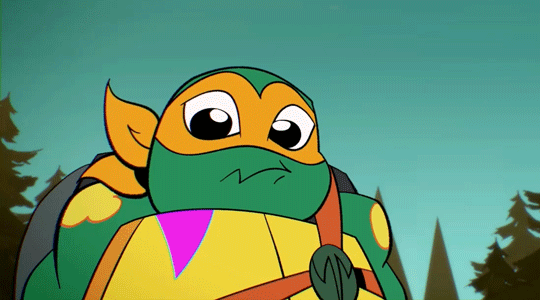
It's family game night, and you being Mikey's special someone (Leo's words, not yours) made you apart of the family. So, you were invited and somehow found yourself in a heated Just Dance battle with Donnie.
"Just give up, my overconfident fellow. You're no match for THE Bootyyyshaker9000!" Donnie exclaimed.
"Oh please. I can take you anyday, Donnie!" You snapped back, hitting all the moves with just as many Perfects and Radicals as he was. It was honestly surprising how good you were at this, or maybe it was just the adrenaline of being able to go against Donnie.
Somehow, by some miracle, you had won. By a singular point, like Sans had beaten Reigen, you had won. And while Donnie was processing the fact that he lost, Mikey was already up and cheering for you.
"You did it! You did it!" Mikey yelled, grabbing you by the waist and spinning you around. "That's my awesome boyfriend!" You giggled as Mikey put you back on the ground, but didn't give you a chance to breathe as you pulled into a hug tight enough to reshape your spinal cord.
"Mikey," you groaned, slapping him arm slightly to get him to let go. Which he did, if only enough to let you breathe.
"Oh, right! Almost forgot! Can't have a victor without a prize!" Mikey exclaimed. You had raised an eyebrow, about to ask what in the world he meant, before his lips came in contact with yours.
Yeah...yeah. You liked this prize.
Casey Jones Jr

Casey hasn't left the spare room since they got back to the Lair. He only left to get some food or use the bathroom, but he didn't stick around to talk. It's been weeks.
The brothers sent you. You were the only one who could get him to talk. So, you slowly openned the curtain to the spare room as to not spook him. Casey had his back turned to you, but he turned around the moment you set foot in the door. It was kinda creepy.
"Hey," you whispered, sitting down next to him.
"Hey," he whispered back.
"Wanna talk about it?" You asked.
"I'm just processing. It's finnaly hit me that...I'm not gonna see them anymore. Master Leonardo, Mystic Michelangelo, Commander O'Neil, any of them. I have them, they're waiting outside, but it's not them. The people who raised me, grew up with me, they're gone. Now, I'm just about if not the same age as the man who raised me. I'm actually meeting Raphael for the first time, instead of just fuzzy memories from when I was a little kid. I'm sitting next to someone who I had heard stories about and admired for years. It's just...so surreal," Casey rambled, holding his head in his hands.
"Well...I guess you'll just have the chance to make some new memories," You said. Casey lifted his head to look at you, skeptical. "It's an awful situation, I get it. But it's up to you to make it a good one."
Casey let out a weak chuckle, wiping the forming tears from his eyes. "Spoken like a true Corporal," he said. You raised an eyebrow, smirking.
"Corporal?" You asked, laughing under your breath as you leaned in a little closer to him. "I like the sound of that."
When your lips met his, it felt cosmically right.
Leonardo
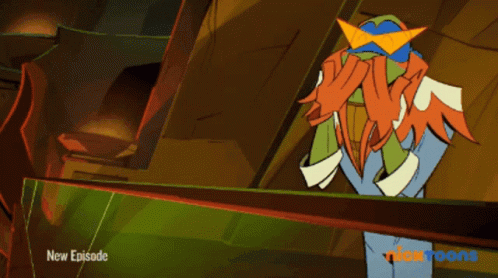
Leo and you panted as Leo slammed the manhole cover shut.
"What was that?!" You exclaimed, throwing your hands in the air. Leo had taken you on a date to this 'cool city under New York,' but you guys got run out two hours in from this gaint crazy spider lady!
"Uh, Big Mama," Leo mumbled, sliding down the ladder to meet you on the sewer floor, "She sorta has the entire place under her boot."
"Seriously?! You thought bringing me there was a good idea?" You exclaimed. Leo sunk back, hugging himself.
"I just thought-" he startes, before you cut him off.
"Cause it absolutely WAS!" You exclaimed, throwing an arm around his shoulder, "Oh my god, that was so cool! Like, yeah, we almost died, but that was the most INSANE first date I've ever been on!"
Leo's previous frown turned into a tentative grin. "Really?" You nodded, kissing his cheek.
"Really," you replied.
Leo's grin widened. "That's great! Wow, was I scared. I thought you'd hate me or something," he said with a relived sigh. A moment passed, before a smirk grew on hif face. "Also, I think you missed earlier."
With a roll of your eyes, you pressed your lips to his for a split second. "Happy?"
Leo shrugged, "It'll do, babe."
Donatello
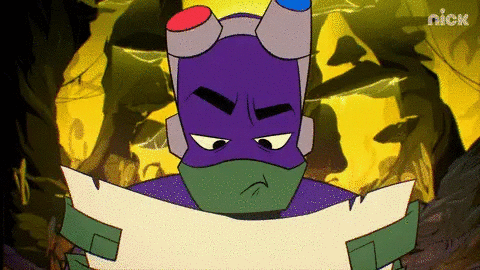
Today was a slow day. Donnie was working on something, and you were sat in a chair out of his way in his lap, spinning it around as you scrolled mindlessly through YouTube Shorts.
"Dad 2," SHELLDON said, flying over to you and pushing his metal face against your cheek, "Father 2. Papa-"
"What is it?" You asked calmly, putting your phone down.
"I want affection. Father 1 is busy," SHELLDON said. With a fond sigh and a smile, you held the robot helper by the sides of his face, peppering kisses along the top of his head. He let out a happy laugh. "Thank you," he said.
"No problem, son," you said, gently motioning for him to move along, which he did happily. You didn't mind the father-son dynamic you had, but as you glanced at Donnie's hunched over figure, you could tell he had a problem with it.
"What's up, Don?" You asked.
Donnie paused his work, like he had just been caught with his hand in the jar, before going back to his work. "Perhaps Father 1 wishes for some affection as well," he mumbled. You laughed under your breath, standing up and walking over to your boyfriend.
He left out a small, confused noise, sitting up as you put a hand on the back of his spinny chair and spun him around to face you. "Are you actually-" he was cut of by your lips falling in line with his. It was only for a few seconds, but when you pulled back, you were fairly sure you broke him.
Until he suddenly happy wiggled in his chair, hands flapping excitedly. You chuckled, nowing you made the right move that day.
#rottmnt x male reader#rottmnt x reader#donatello x male reader#donatello x reader#leonardo x male reader#leonardo x reader#raphael x male reader#raphael x reader#casey jones jr x male reader#casey jones jr x reader#michelangelo x male reader#michelangelo x reader
1K notes
·
View notes
Text
So I've been playing around with Cāngjié…
And I thought a post like this (similar to a post on Zhùyīn done by linghxr) may be of interest to some.
Edited: 10 Sep 2023
This post has gotten a little popular lately and on scrutinizing my own post again, I've come to the conclusion that I had made some mistakes in my given character examples.
Amended now. Namely, 「唔」 and 「龍」 have now been swapped over in the examples.
「唔」 is really the “3-parts”, and 「龍」 is indeed a “2-parts” character! Amendments are reflected in orange.
What (and who) is Cāngjié?
For those who may not know, Cāngjié is another way to input 漢字/汉字 (Hànzì — Chinese characters). It is way less popular than Pinyin (or even Zhuyin) but it still has its fans, and has a few advantages over the other two.
Cāngjié is also the name of the mythical figure in Chinese legend who is said to have been the inventor of 漢字/汉字, for which Cāngjié (the input system) was named after.
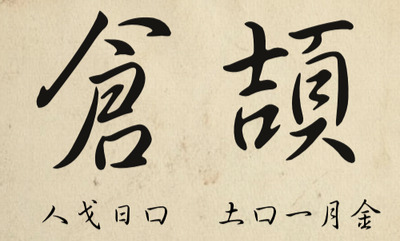
Would I recommend it?
Yes, if you think you have already acquired a good (enough) understanding of 漢字/汉字, and/or just like a new challenge.
(TL;DR at the end)
Why am I learning Cāngjié (and why you may like to, too)?
1. Mostly for fun.
Have long been intrigued by both Cāngjié and Zhùyīn, and since I finally mustered up the courage to tackle Zhùyīn not too long ago, I thought I'd finally give Cāngjié a try.
While learning Cāngjié does require more effort than learning Pinyin or Zhuyin, it can also be really fun! Inputting 漢字/汉字 with the Cāngjié method is almost like doing a jigsaw puzzle.
The euphoria derived from figuring out and piecing together the radicals that make up a word is something that learning Jyutping (Cantonese equivalent of Pinyin), Pinyin or Zhuyin can't quite match.
And while I know I'll never be as adept with Cāngjié — my knowledge of 漢字/汉字 is nowhere near good enough to ever use Cāngjié efficiently — as I do Jyutping or Pinyin (or to some extent, Zhuyin), it'll still be fun to use Cāngjié every once in a while!
2. Helps with thinking and typing in Chinese.
The upshot of relying too much on using Jyutping/Pinyin/Zhuyin is, I'd tend to think in Roman letters or ㄅㄆㄇㄈ before I'd even think about the actual 漢字/汉字.
But with Cāngjié, because it's based on knowing radicals and joining them together to form actual characters, it'll encourage thinking of 漢字/汉字 first, so I think that would help some with 漢字/汉字 memory retention.
Now you may be thinking, why not just you know, practise actually writing then? That is the tried and proven method to better remember 漢字/汉字 after all?
Yes, of course I can do that — and am doing so occasionally — but we live in a digital age now, and the probability and opportunity to type things out is much higher than actually writing stuff by hand.
The idea here is, more looking to think of and envision characters fully in my head, and trying to lessen over-reliance on Jyutping/Pinyin/Zhuyin.
And this is where I find Cāngjié can be useful, which leads to my next point…
3. Haunted by “What if” scenario.
What if there comes a day (however improbable) where I'm presented with only a Cāngjié keyboard to use for typing Chinese? It has happened with Zhùyīn for me!
That means, no Pinyin or Zhuyin keyboards, no Handwriting tools/touchscreens to write with fingers/mouse, no speech-to-text, and no option to copy-and-paste characters from somewhere else either! What then?
4. Able to type without knowing pronunciation, and with more accuracy.
Cāngjié is shape-based. Unlike Jyutping/Pinyin/Zhuyin, where you have to know what a character sounds like before you can type it out, with Cāngjié, you can type out (again assuming no Handwriting or other tools available) characters without needing to know how to pronounce them at all.
With shape-based typing, you'd also get more accurate hits in the first few 漢字/汉字 that show up, versus sound-based methods like Pinyin where for e.g., typing out “wan” will get you a whole list under the same sound and you may have to scroll through a whole lot to get the exact “wan” you need.
You can also type both Traditional and Simplified characters without having to toggle something or switch keyboards.
So how does one begin learning Cāngjié?
Install a Cāngjié keyboard.

Duh…but of course! Heh! Gboard offers one, banded under Cantonese language input (Android user here, don't know about iPhones, sorry).
There are two versions of Cāngjié that are prevalent currently. Cāngjié 3 and Cāngjié 5. Cāngjié 5 is supposed to be an improvement over version 3 but I don't find there's much; having a slightly altered version just adds to the confusion and unnecessarily complicates matters, in fact!
If you have a choice, I'd recommend selecting Cāngjié 3 as that is more supported. Some operating systems may not be too compatible with Cāngjié 5 still, for some strange reason.


You may also come across something called “Quick” (速成) aka, “Simplified Cāngjié”.
This is simply a scaled down version of Cāngjié, it's still based on Cāngjié's formula. So you still need to know how Cāngjié works in order to use “Quick” efficiently.
You'd then need a chart like this. ↓

* the 重 (Z) key doesn't really come into use. I don't really know what it's for, but it seems to be used (paired with other keystrokes) mainly to type out various punctuation marks.
There are variants out there, some having a little more, or less, radicals shown than in the above example, but I'll say the chart here is one of the more comprehensive ones I've found so far (and sufficient enough) — other charts often fail to highlight the 難 (X) key and what it corresponds to.
You don't have to memorize the chart all at once. Just always have a chart like this on hand to refer to and with enough typing practise, you'll eventually remember which key corresponds with which radicals.
Remember the rules. ↓
“1 part” character (e.g. 寫) = first 3 & last (radical).
“2 parts” character (e.g. 唔龍) = first & last, first 2 & last.
“3 parts” character (e.g. 難) = first & last, first & last, last.

e.g. 寫 ↓
With radicals 宀,丿,臼 (first 3) and 灬 (last).
Corresponding keys: 十,竹,難 and 火。
寫 → 写 ↓
With radicals 冖,卜,㇆ (first 3),一 (last).
Corresponding keys:月,卜,尸 and 一。

e.g. 龍 ↓
With radicals 亠,月 (first & last), 卜,コ (first 2),ヒ (last).
Corresponding keys: 卜,月,卜,尸,and 心。
龍 → 龙 ↓ (Simplified 龍 → 龙,a “1 part” character)
With radicals 丶,ナ,ヒ (first 3).
Corresponding keys: 戈,大,and 心。

e.g. 難 ↓
With radicals 廿,人 (first & last),亻(first & last),土 (last).
Corresponding keys: 廿,人,人 and 土。
難 → 难 ↓
With radicals ヌ (first & last),亻(first & last),土 (last).
Corresponding keys: 水,人,and 土。
Occasionally, you may get a character that looks like a “2 parts” but is actually a “3 parts”. ↓


e.g. 唔 ↓
With radicals 口 (first & last),一,一 (first & last),口 (last).
Corresponding keys: 口,一,一 and 口。
Or looks like a “1 part” but really a “3 parts”. ↓

e.g. 奪 ↓
With radicals 大 (first & last),亻,土 (first & last),丶 (last).
Corresponding keys: 大,人,土,and 戈。
奪 → 夺 ↓(Simplified 奪 → 夺,a “1 part” character)
With radicals 大,寸 (first 3; the 丶 is the 3rd component).
Corresponding keys: 大,木,and 戈。
But these are exceptions, and don't occur that often.
And you can start practising!
You can try out this pretty good app called 『五色學倉頡』 (learning Cāngjié with 5 colours), for practise. It's on Playstore, just search for “Cangjie Dictionary” and it should show up.
You have to pay to unlock higher levels, unfortunately. ↓






Anyway, each character comes with colour coded hints and you can opt to turn them off if you like more of a challenge. There are also hints (提示) and the chart (字根表) to refer to if you're really stuck. Also has a dictionary component (查字典) to check out the Cāngjié input for characters.
Another option would be a website called HKCards. ↓


You can use it to check the Cāngjié input for any 漢字/汉字, and there's section for practise (倉頡輸入法練習) as well. After inputting your answer with Cāngjié keys (手田水口廿卜), you can click on the “Answer” (答案) button to see how right or wrong your answers were. ↓





There are 8 characters each time, and you can just hit “Practise Again” (再做練習) to refresh for another 8 to practise with. I've yet to hit a limit.
Unfortunately, this website has lots of ads popping up. And it only supports searching in Traditional characters (Cāngjié was initially catered more for Traditional).
Or you can just try practising randomly with a Cāngjié keyboard and check for mistakes with a Cāngjié dictionary (『五色學倉頡』 app's dictionary comes in really useful here — it appears to support searching in Simplified too).
TL;DR
Cāngjié could be useful (and fun) to know if your 漢字/汉字 knowledge is already adequate, and/or you just like a new challenge.
And if watching videos is more your thing, here's a really helpful YouTube tutorial on how to use Cāngjié (has English subs)!
#Cangjie#Congkit#Cantonese#Mandarin#Jyutping#Pinyin#Zhuyin#Bopomofo#Traditional Characters#Chinese Language#Language#Long Post#Dake Rambles
247 notes
·
View notes
Text
*thinking emoji*

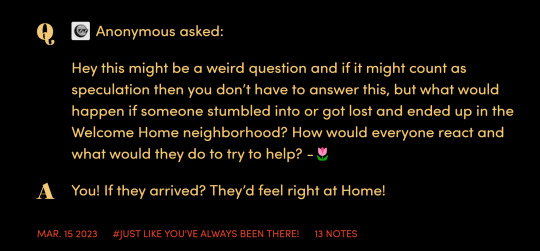
it's been pointed out before that almost every neighbor Conveniently has a backstory that involves them having existed Somewhere Else before they arrived in home... but it seems unlikely that those backstories are the whole truth. i think the question here is whether or not they are Mostly true and it's a matter of lying by omission OR if they were fabricated entirely. or in other words: is there a world out there in that plane of existence that home keeps its population isolated from as a result of human interference (i.e. the show)? or are they all just Completely made up and home is all there is. what does it mean if some backstories are more vague than others? alternatively: it's an "it's a good life" by jerome bixby situation and there Used to be a world outside of home, but well. Not Anymore.
also - i know i've ragged on this idea before for being overplayed as fuck in puppet horror - but i have to admit that the idea of there being Some kind of haunting/possession/transmutation bullfuckery is becoming more plausible. something something dehumanization/erasure of one's identity for the convenience of the status quo being taken to its logical extreme. that said i'm still banking on them having Always been puppets for various reasons so i'm putting that theory on the "FINE i GUESS i can roll with it if it ends up being canon" shelf for now. alternatively: some kind of SOMA-esque situation where a base personality/set of traits is derived from a human puppeteer but bc of the environment/being at the jurisdiction of the studio/having totally different memories, they develop in Radically different ways than their source? so many possibilities...
#welcome home#wh speculation#public notice#the gap between memory and reality widening over time... other gaps that could widen as well?#hm.
433 notes
·
View notes
Text
Here are some fun / amusing / potentially-interesting facts about the process of writing and plotting Almost Nowhere, if anyone's curious.
Major spoilers for the whole of Almost Nowhere under the cut.
(There's really no way to spoiler-censor this material without rendering it incomprehensible. If you haven't read the book, do that first before reading this post.)
(1)
A large fraction of the book's eventual plot emerged from my attempts to patch a single, in-some-sense trivial continuity error I made while writing the very first chapter.
The Mooncrash section of that chapter ends with this sentence (emphasis added):
All parties were used to stillness, now, for the Mooncrash was nearly four years old.
And a few paragraphs later, in the opening of the Academy section, we get this (emphasis added again):
For (as everyone knows) the Shroud is upon us and while it tolerates the Academy — as it presently is, as it has been for the last eight years, a chrysalis, preparing itself step by minuscule step [...]
So: The Mooncrash is 4 years old. The Academy crash is at least 8 years old, and indeed older.
Yet the Mooncrash is also as old as the crash system itself! It was made by humans, during the period between the discovery of the anomalings and the mass-crashing of the human race. (This is only shown in the second chapter, but I had it in mind before then.)
How long has the human race been crashed, then? At most 4 years, and at least 8 years? How could that possibly be?
It would have been easy enough to just edit the chapter, but that's not how I do things. Restrictions, famously, breed creativity. I enjoy attempting to solve puzzles I have inadvertently created for myself, and many of my best ideas have been produced through this process.
It would also have been simple and easy to merely say: "OK, I guess time elapses at different subjective rates, in different crashes."
Amusingly, I ended up doing that anyway! But for some reason, this avenue didn't occur to me at first. By the time I started asking myself whether to include this kind of effect, I already had a different solution in mind.
I spent a lot of time beating my head against the figurative wall, trying to resolve the 4-vs-8-year issue. The early parts of my AN notes are full of this stuff.
----
At some early point, I came up with the idea that the anomalings/shades would deal with troublesome crashes by "rebasing" them, rewriting their histories.
I didn't intend, initially, for this idea to take over the plot as much as it eventually did. It was just a fun idea that underscored the huge power differential between the anomalings and their captives, and felt in line with the Cartesian/Wachowskian themes of transcending a "fake"/illusory world, radically doubting one's own perceptions and memories, etc.
But, having stipulated that "rebases" were a thing, I hit upon the idea that they could be used to modify the total quantity of past (subjective) time inside a crash -- turning 8 years into 4, or vice versa, or whatever.
So, I could fix the problem by stipulating that one -- or both -- of the problematic crashes had already been rebased, in this way.
But why? And by whom?
----
Now, at this early stage, I also had the idea in mind that the character "Anne" would eventually escape from her crash, and that she would have a hand in various major events in the story -- including some events that had already occurred, relative to the "present" of the textual PoV.
But I didn't know, yet, what these interventions actually were.
(I put "Anne" in quotes, here, because in the very early stages I casually assumed that only the PoV Anne introduced in Chapter 1 would be a major character, and that her sisters were merely background material for her personal narrative, like the tower itself. Of course, in the process of thinking through the details of things, I realized that this assumption was needless and indeed counterproductive.)
As often happens when I'm plotting a story, I found that two unknowns slotted neatly into one another, each one providing a potential solution to the problem posed by the other.
We need something for "Anne" to do in the past. Something consequential, something that shows off her newfound agency -- but also something that obscures her role from view. Ideally, something kind of weird, esoteric, "advanced"; something that feels buried inside the deep, dark center of the backstory, which the reader will only "excavate" at the end of a long, strange journey.
And we need someone to rebase the Mooncrash.
That answers the "who?" question. But again -- why?
Well, it was already in the plan that Azad would join forces with Michael, when Michael went in search of his lost Anne. That Anne would meet Azad, as a result, and that it would be Azad who persuades her to return to Michael's crash.
I didn't, at the time, have much else planned for the Anne-Azad connection.
As originally conceived, the "Azad convinces Anne to return" scene was about Azad's uncertain loyalties, and about Anne's lack of exposure to other human beings (and to the power of words, as deployed by human beings with access to real human culture). That is, it merely served specific, separate purposes in the sub-stories of these two characters. There was no intent to set up, or develop, a thread connecting these sub-stories, making Azad a major character in Anne's arc and vice versa.
But that seems like kind of a shame, doesn't it? Why go to the trouble of preparing these characters, and bringing them into contact, if I didn't have anything for them to do together?
Anne and Azad.
We need someone to rebase the Mooncrash.
We need Anne to learn about real human culture, somehow, before she leaves. I knew that, already, though I didn't have a mechanism in mind.
(I also knew, by this point, that causing Azad's appointment as translator was another one of "Anne's" consequential moves. I had conceived of this, at first, as a relatively impersonal act, done only for its historical significance. Indeed, that would have been enough -- but the more the merrier, theme/motivation-wise.)
Problems paired up, interlocked, and became each others' solutions.
(1b)
As is obvious from the above, I didn't have the scenario planned out in very much detail when I wrote the first chapter.
At the time, the story had been gestating in my head for a while, but only as a bunch of vague inklings and intentions.
The proximate cause of writing-the-first-chapter was a sudden and unexpected burst of inspiration. I was riding the bus to a social event, and suddenly my mind was awash with crisp, never-before-glimpsed details about Anne and her tower, the Mooncrash, the Academy, Cordelia's blue dress -- all the stuff of Chapter 1. It felt like a crucial message was being beamed into my brain, VALIS-style, from the Muse / Higher Power.
I had an urge to bail on the social event, turn around, ride back home, and start writing immediately -- what if the magic went away, as suddenly as it had arrived? I resisted that urge and made a perfunctory appearance at the event, but then went back home and wrote as much as I could before falling asleep.
So, when I was writing that chapter, stuff like "four years" and "eight years" wasn't based on any single coherent picture, just vibes and vague inklings.
(I think 4 years probably sounded like the right amount of time for G&A to have been in the Mooncrash, character-wise. Meanwhile, Hector's ascension from the Academy had to be long enough ago that there would be no direct overlap between Hector and any of the current students. The "Bad Old Days" had to feel like something you'd only hear about in rumors, or from authority figures who probably weren't telling the full story.)
(2)
Like TNC before it, Almost Nowhere was originally conceived as relatively simple and straightforward story, only to become something much weirder and more complicated as I fleshed out the details.
As I said above, I only had a very vague "plan" at the outset of the writing process. But I kinda knew where I was going with it, in very broad strokes.
The original arc, insofar as it existed at all, was something like:
The bilateral / anomaling tension is introduced.
The bilateral PoV characters come to an understanding of their situation.
Many of the bilateral PoV characters join up with Hector Stein, who is already trying to defeat the anomalings and free humanity from the crashes.
Azad temporarily sides with the anomalings, and Anne temporarily returns to her captive state. But both them "come around" eventually.
Anne eventually triumphs over Michael, delivers a dramatic monologue castigating him for imprisoning her (etc.), and mounts a successful escape.
Shortly after Anne's escape, some (TBD!) resolution to the main conflict is achieved. Whatever it is, it is proposed/spearheaded by the bilateral faction (and specifically Anne herself), and it somehow exemplifies "the bilateral way of thinking/being."
The humbled anomalings conclude that "the bilateral way of thinking/being" has its advantages, both practically and morally.
So the story, as originally conceived, was much more straightforwardly about the "good" PoV humans fighting back against aliens.
It unabashedly took the bilateral side in the conflict, and it ended with a "beauty of our weapons" sort of moment in which the bilaterals are both victorious and righteous, and in which these two kinds of success are closely linked and almost merged.
I have to imagine that, even in counterfactual worlds where some things went differently, I never would have stuck to this version of the story all the way through.
Because, one way or the other, I would have eventually realized that.. like... this version of the story kind of sucks, right?
I mean, why go to the trouble of introducing these aliens, and trying to make them interesting, only to say "nah, actually these guys were just wrong, it's us and our existing 'ordinary' pre-conceptions that are right, and that's what the story was about all along"?
It would have been "inventing a guy to be mad at," as the saying goes.
Not a great foundation for a story. And the least interesting possible direction to go in, given this kind of setup.
It also presents a seemingly unresolvable tension, for the writer, about how to portray the distinctively "bilateral" nature of the bilateral side in the conflict.
If "bilateral" is as broad a category as the anomalings say it is -- if you and I and all of us, whatever other qualities we possess, participate equally in this sin -- then it's hard to strike a note of emotional triumph around the quality of "bilaterality" that doesn't feel wrong, vacuous, or bloodlessly abstract.
"Woo, yeah, humans are great!" I mean, are they? All of them? You don't get to say "well, only the good ones," here, or "in their ideals if not always their acts," or anything like that. Everyone is included in the relevant category, except for the guys-who-aren't that were invented for this specific story.
It's difficult to make this land properly, in the same way it would be difficult to write a story that inspires "carbon-based life pride" or "having-DNA pride" or the like in its reader.
So this version of the story was dead on arrival. And indeed, by the time I was thinking through the stuff chronicled in (1) above, this version of the story felt like a provisional placeholder, at best, in my mind.
Nonetheless, there are various echoes of it in the story I eventually landed on.
For example, in the original version of "Anne's" escape -- conceived in a much more straightforwardly positive way -- I had Anne reading "real" books in secret, drawing moral strength from them, and then including a bunch of literary quotes in her big dramatic monologue to Michael. (I took inspiration, here, from John the Savage reading Shakespeare in Brave New World.)
And I had the idea that "Anne," being an autodidact, would read omnivorously without making culture-bound distinctions familiar to you and me; that her selection of quotes, in the monologue, would put low culture alongside high culture, infamous books alongside famous ones, etc.; and as a particular case, that it'd be fun if -- before going on to quote Shakespeare and co. -- she began the whole thing by quoting Ayn Rand.
And that one idea stuck, even if the rest of it didn't.
(Or, consider how the idea of "a powerful move in the conflict that exemplifies the bilateral way of thinking/being" actually crops up multiple times in the finished story, right up to its last scenes. One can see traces of it in the "trick" that obsesses Michael, in the use of autobiographical writing to build up nostalgium, and in Annabel's improved crash design.)
(3)
I came up with the Mirzakhani Mechanism relatively late, in between writing Chapter 13 and writing Chapters 14-15 (in which the MM is introduced).
The MM was a product of looking back at the sci-fi elements that already existed in the story, like crashes and rebases, and trying to invent some single underlying explanation that covered all of them in a relatively parsimonious way.
This basically "worked," I think -- it certainly worked better than I had been expecting, after playing the dangerous game of "write a bunch of weird stuff and hope you'll be able to explain it all later." (I remember talking to one reader who was shocked that I hadn't had the MM in mind from the very beginning, which was flattering.)
It also had unintended consequences that kinda took over the story, but largely in a good way.
Earlier, I had planned to have the post-rebase crash timelines "screened off" from the outside world somehow, so that rebasing a crash wouldn't mess up the timeline of the outside world. But, once I'd fixed the idea that "rebasing is an MM event" in place, I realized that this wasn't consistent with the way MM events were meant to work. Instead, the exposition in Ch. 15 directly implies the stuff about rebases that Grant realizes much later in Ch. 41.
Once I'd noticed this, it was obvious that it was extremely important, and I re-incorporated it into the broader plot.
On a related note, I eventually decided that the account of the anomalings "going backward in time to our era" in Ch. 15 didn't really make sense. This meant I needed a different, more viable way anomalings and bilaterals to exist at the same point in time.
This line of thought, along with several others (like "what happened to all the nonhuman organisms?" and "which parts of the MM multiverse are real?"), eventually led me to invent Everywhere-Heaven and the beasts.
That happened right at the start of 2022, between Chapters 21 and 22.
It quickly became clear that the E-H/beasts stuff could be put to a lot of valuable use in story's third act, which was largely a worrying blank space in my head (even at this point!). From thereon out, I worked on fleshing out the third act behind the scenes while writing the second.
Not coincidentally, Chapter 22 contains a ton of E-H-related foreshadowing, and also some hints that human scientists (like Aidan in Ch. 15) had never fully understood the anomalings.
The use of Maryam Mirzakhani, a real (and recently deceased) mathematician, was a weird choice and arguably one in poor taste. All I can really say in defense of it is that it came to me suddenly, and had a number of properties that fit the vibe of the part of the story in which it appeared, and I have a policy of "going with my gut" when it suggests such things to me.
I felt similarly about this choice and another thing introduced in Ch. 15, the nuclear attack intended to kill scientists. Both of these things underscored the fact that the story took place in an alternate reality. And both felt sort of "edgy," "too dark," "too close to the real world" compared to the tone of the story so far. But I wanted to take the story to new places in the coming acts -- "darker," "more real" places -- and something felt right about introducing these elements at this exact point, as signposts providing an indication of where things were headed.
(4)
The phrase "NOWHERE TO HIDE" was originally "NO MERCY," in my notes.
And the abbreviation "NM" for "NO MERCY" was used throughout my notes for Nowhere-To-Hide related stuff, e.g. "NM Annes."
This wasn't the product of much thought, just the first thing that came to mind that had roughly the correct vibe. I almost immediately concluded that I'd have to replace "NO MERCY" with something else in the work itself, since it would seem like an Undertale reference that I didn't intend to make.
"Moon" was originally just a placeholder name -- a shorthand for "the 'NM Anne' who rebased the Mooncrash." But I liked the idea of actually using it, once it had occurred to me.
The corresponding placeholder name for A11 was "Ling," as in "linguist" (but also an actual name).
(5)
I went through 3 different outlines of the third act.
Really, there was a first outline, which was really bad, and then there were two slightly-different versions of a very different outline that mostly corresponds to the finished draft.
The first, bad outline was amusingly titled "notes-satisfying-ending.txt", because I explicitly used this post about "satisfying endings" as a guideline while writing it.
(To be clear, I don't think the linked post was to blame for the badness of that first outline. I didn't ultimately find the post very helpful as writing advice, but the "satisfying ending" outline wasn't even a "satisfying ending" in the post's own terms, and was also bad in unrelated ways.)
I don't want to go into much detail about the bad outline. It was really bad, and also really different from what eventually occurred. It's honestly a pretty embarrassing document.
A lot of the key ideas were there (E-H, etc.), and the very end of the story was roughly the same. But it had a ton of needless flaws that I later corrected. Various existing character arcs and motivations were dropped and never picked up, or suddenly diverted in some new and unfruitful direction; way too much time was spent on getting characters and objects from point A to point B, or otherwise sort of rambling about in a way that didn't matter in the end; it included a lot of whimsical "fun ideas" that weren't necessary and would have added clutter to an already very full canvas; etc.
I never got to the point of building a chapter-by-chapter version of this outline, but I'm sure it would have much longer than the existing third act, also.
The existing third act is pretty long, but it was actually the result of an aggressive pruning and tightening process.
If the "satisfying-ending" outline had a single greatest flaw, it was terrible pacing. Lots of slack, lots of empty space, and when big things did happen, they came out of nowhere, not really prompted by what came immediately before them.
The next draft of the ending resulted from taking the raw materials of "satisfying-ending," purging all the dross, re-thinking all the obviously flawed stuff, and then trying to rearrange the pieces in front of me in a way that was maximally "tight" and interconnected, with questions and tensions introduced and then resolved in a rapid-fire manner, and without any major thread "sitting around in the background" long enough to feel stale, or get forgotten.
That outline was in a file called "notes-good-end.txt."
Much later, I tightened up the plan even further, merging some things that were originally in separate chapters. This was in a file called "notes-true-end.txt", and -- true to its name -- was the version reflected in the book itself.
So there was "satisfying-ending," which sucked; "good-end," which was good; and "true-end," which was slightly better.
(I realize the multiplicity of the ending, and the account of deliberate "tightening" etc., is in apparent tension with my recent account of working by direct inspiration.
There are a few things I can say about this tension.
For one, it really is true that the third act of AN was more deliberately reasoned-out, and less directly-inspired, than some of the earlier stuff. This is kind of inevitable: you don't get to do anything after an ending, that's what an ending is, and so you have to deliberately try to make the final act of a story fully work as a thing unto itself, rather than writing checks in the hope of cashing them at some later point.
And separately, I do think the final version of the ending feels "more real," "more true to the work" than the satisfying-ending draft.
I think I was aware, even while composing "satisfying-ending," that it felt off and wrong in some ways. But it was only after going through the exercise of creating a complete ending -- some sort of complete ending -- that I was able to look back and say "OK, this fits, but this doesn't fit," and distill something that actually felt right.)
60 notes
·
View notes
Text
Do flowers bloom from walkers? (Radical optimism in The Walking Dead: The Final Season)
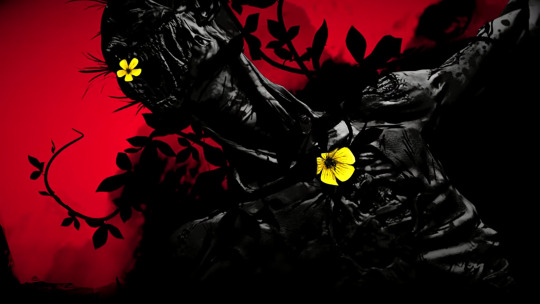
I remember playing The Final Season for the first time way back in October of 2022 and immediately being blown away by how polished the game was in comparison to its predecessor. I mean I had always loathed the visual style of A New Frontier, so this comic-book inspired look was a nice change of pace, especially once combined with the expert use of lighting that is present throughout the game. But what really took me off guard, more so than anything else, was the opening credits.
I mean, obviously; these games had never done anything like this before. And while I'm fond of the whole FADE IN TITLE ACCOMPANIED BY OMINOUS MUSICAL CUE, this was a welcome change. But there was one specific image that stuck with me throughout my playthrough: the decomposing walker (pictured above), painted in greyscale, with the only colour being the stark red background and the yellow flowers blooming from its corpse. I like to think that it was an intentional decision that ties into the game's themes and not just "Oh this looks cool, let's do it", but it weirdly never came up again. So I was kind of just left to play the game while it loomed in the back of my head, waiting for its moment to shine.
It wasn't until almost a year later where I'd figure out what the image represented, or at least my interpretation of it, and I settled on this conclusion: this decomposing walker is supposed to represent this apocalyptic world, and the flowers symbolise the people that attempt to build from it, in this case the Ericson's kids.
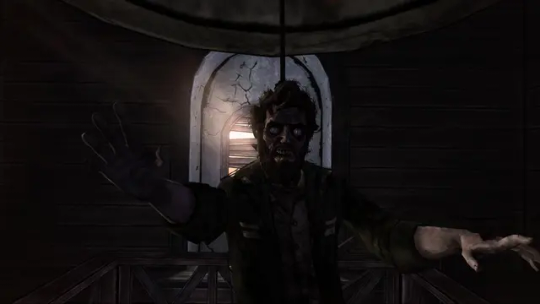
I've had this opinion for a while that if the first three games show the attempts and failures to re-establish the old world ideals of order and civil society, then The Final Season serves as a rejection of that idea. From the walker-ridden fortress of Crawford in Season One to the bureaucratic nightmare that was the New Frontier, it's an accepted fact that these attempts at returning to the methods of days gone is ultimately futile and will result in total collapse, largely due to the decisions of its rulers. While we could argue about which of these groups is truly the worst, they all originate from the same basic principle: a desire to return to normality. Crawford, Howe's, the New Frontier; these groups were formed by people who, while cruel and monstrous in their own ways, all had the admittedly noble goal of attempting to return order to this ravaged world, but failed due to their leaders' cruel and selfish actions.
Or did they? (Vsauce sfx)
There's this interaction Lee has with Katjaa in the very first episode of Season One that has stuck with me for a while. It's an optional dialogue so it's very easy to miss (I did on my first playthrough), but when Katjaa hopes that things can go "back to normal", Lee has the option of expressing resentment for this old world:
"But they weren't before? The banks, the politics, the--the crap--those things are gone. Hell comes in a lot of different colors."
Usually this "fuck the old world" sentiment is expressed by sociopaths who are excited to enact their sadistic desires onto other survivors, but Lee's resentment for society feels a lot more justified. The fact that Lee is a black man who's specialty is American history makes his criticism of wanting to go back to how things were feel more warranted; he's someone who understands how corrupt and unjust the societal structure of the past was, so of course he'd feel conflicted about longing for its return.
And while this is just a small interaction, I feel it plays into what I've been talking about. Crawford, Howe's, the New Frontier; did these factions collapse because of their evil leaders, or because they were emulating an inherently unjust and corrupt power structure? Their desire for order and stability allows them to see past the cruelties that came with building these hierarchical societies, to the point where they begin to mimic governments of the old world (Crawford, discrimination and the outlining of "undesirables"; Howe's, prison labour and terror; the New Frontier, imperialism and state corruption). So these failed factions force us to ask the question: is a return to order possible in this world?
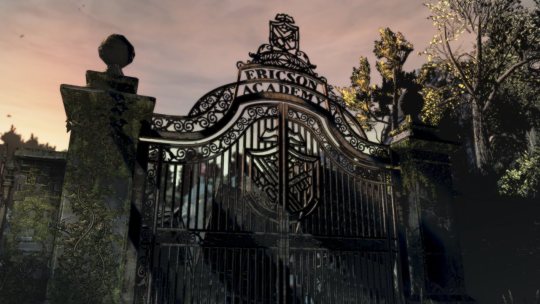
It isn't until the The Final Season that the games give us an answer to that question: no, it isn't, but that doesn't mean you can't start something new.
When introduced to Ericson's it's made immediately apparent how different they are to any other group we've met before. While there's the obvious homage to Lord of the Flies with a group being made up of entirely children, I think this is more than just a "well it's the final game, best do something interesting". Children are a symbol of hope and optimism, but also of potential and, in a more abstract sense, the future. They are clay that has yet to be moulded, with infinite potential, a luxury most adults don't have. So I don't think it's a coincidence that the main group in this game, and the one that Clementine eventually settles with, is comprised entirely of children: it feels like an intentional choice to highlight how this group will be the one to survive on account of how they have the potential to create something new.
And it's not just their age demographic that makes Ericson's so distinct from the other groups in the series, but also their power structure. Following Marlon's death, their is no one person in control of the group. Sure, there are leaders (Violet takes the chair once Marlon's out of the picture, and upon her return Clementine becomes the one who's advising the group), but they feel like role models and advisors more than anything. When Violet takes the reigns it doesn't seem like anyone truly acknowledges her authority, and she doesn't even seem to enforce it either. Same goes for Clem; she doesn't really express any desire to control the rest of the group, instead preferring to make decisions in a more democratic manner as to include everyone's individual skills and expertise.
Ericson's vision of society more closely resembles that of an anarchist commune than any government that previously existed, and it manages to be the only group left standing by the end. It's through cooperation and an altruistic attitude that keeps them alive in the end; their concerns for the survival of the group far outweigh any desire to create "order". And I don't think it's a coincidence that a majority of the game's antagonists (Lilly, Minerva, and even James) are people who represent the past. Lilly is obsessed with the cruel lessons her father taught her and prides herself in her attachment to the militaristic level of discipline that she inflicts upon her subordinates. Minerva is essentially a ghost of the past, with her whole arc with Violet and Tenn serving as a lesson on the dangers of holding onto the past. James, while good natured and mostly kind, can't bring himself to accept the fact that the world has changed, and its these beliefs that either kill him or sever the only connection he had made in years.
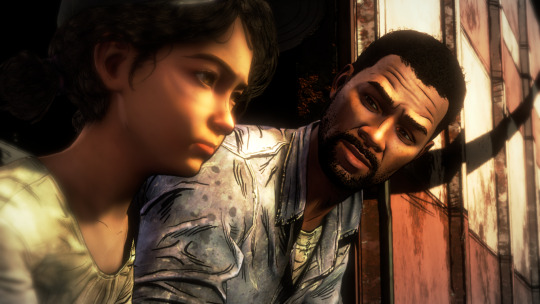
To conclude, while Telltale's The Walking Dead is a series that is rife with conflict and tragedy, I also find it to be a story that is ultimately about hope. I always considered that Lee's greatest lesson to Clementine wasn't how to shoot a gun or to cut her hair, but instilling within her a radical sense of hope, the idea that things can be better, and you should always try your damnedest to make it happen. That even in the most desolate of circumstances, something profoundly beautiful can bloom.
Or maybe I've been wrong this whole time and flowers growing out of a walker just looks really cool.
#i didn't expect this to be so long but oh well#needed to rant about twdg so i chose this instead of the wall#twdg#the walking dead game#clementine#twdg clementine#lee everett#media analysis
64 notes
·
View notes